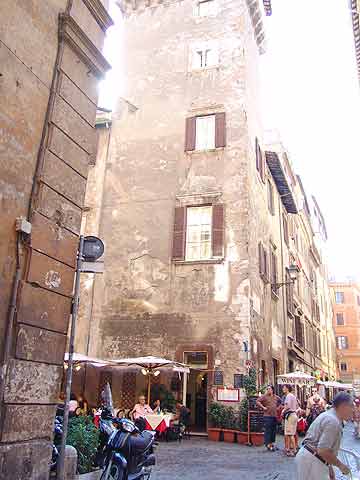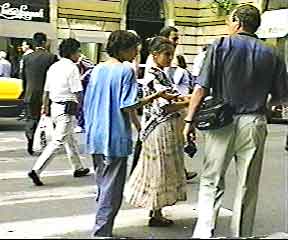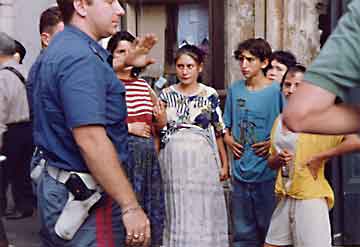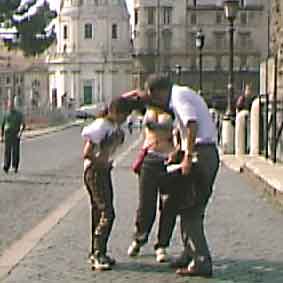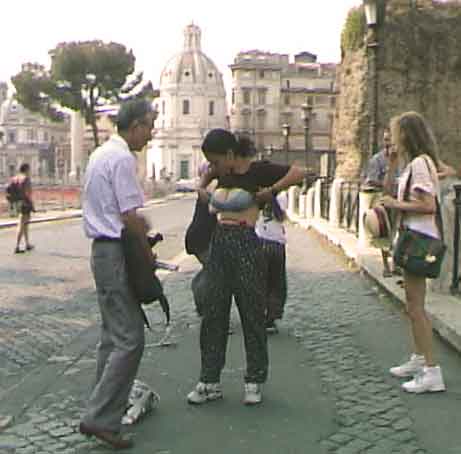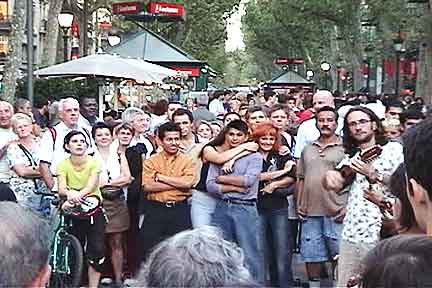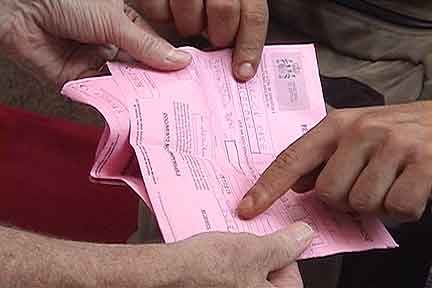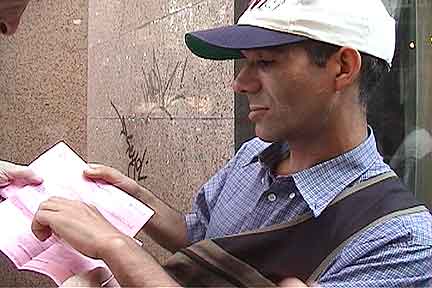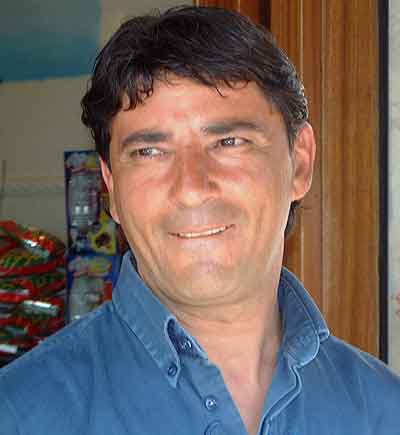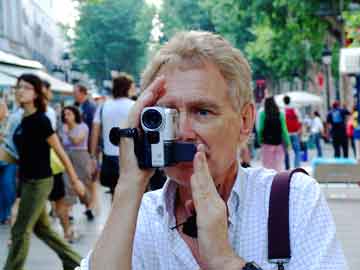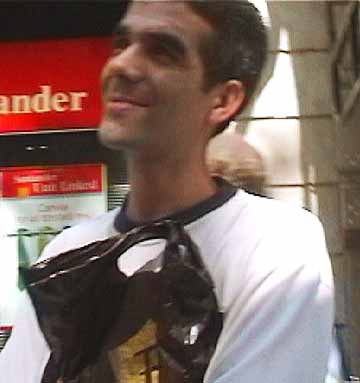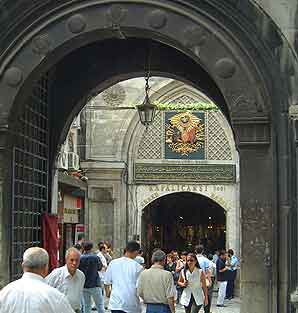
Turkey Vultures—We’re off duty in Istanbul, so we roam around the Grand Bazaar, buy a shawl, buy a cd, seize photo opportunities. We go out the back of the covered market and I can’t resist buying an ice cream cone and the show that goes with it. I’m delighted, even knowing each move before it happens. The ice cream cart has a row of deep bins, each holding a different flavor of the weird Turkish ice cream.*
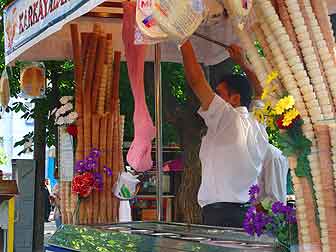
To drum up business, the ice cream man bangs his three-foot-long spatula on the bins in a catchy rhythm. then he stabs the pink ice cream and raises it high out of its bin in a solid blob and lets it slowly stretch like pizza dough or silly putty. Turkish ice cream has a consistency completely unlike what we’re used to.

I ask for a small cone and the ice cream man goes into high-speed. He scrapes a bit of ice cream from each bin and creates a rainbow stack on the cone, layer by distinct layer. He hands the creation to me and I take the cone—and suddenly it’s just an empty cone in my hand. The laughing ice cream man holds my purchase over his head and makes a face. He takes the empty from me and offers the one I’m drooling for but as I reach for it, he lets it swivel upside down and I grab air.
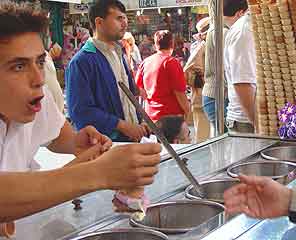
One more time he offers the cone, and this time I’m left with just the paper wrapper in my hand. As I finally chew my ice cream (yes, it’s chewable stuff), I watch a Canadian woman argue about the price of a cone. After grudgingly paying, she swears the man short-changed her.
Istanbul pickpockets
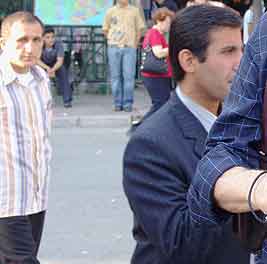
It’s 6 p.m. Just beyond the ice cream trolley is a major bus stop. Buses pull in and line up in three ever-changing lanes. Bob and I instantly notice a “suspect.” He’s wearing a navy pinstripe suit with a smear of caked mud(?) on the back of the left thigh, and he carries an odd shaped package loosely wrapped in a plastic bag—his tool.
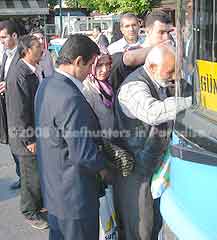
Soon enough we identify his buddies. I pretend to take a picture of of Bob while shooting two of the gang behind him. They’re not suspicious of us, and one (in the striped shirt) even steps up beside Bob and smiles at me, as if he wants to be in a picture. (I’ll call him Ham, but I should call him smug.) My damn camera is set on too high a resolution—I can’t snap a second shot because the first is still recording.
Now they perform for us, proving our fine-honed sense of thief detection. But we’re not ready with equipment! In fact, since we hadn’t planned to be on the prowl today, we don’t even have proper equipment. So Bob uses his new tiny camera in video mode, then promptly deletes the half-minute of footage by accident. I take a still shot, but a woman steps in front of the action and blocks the money-shot. We both get mediocre stills.
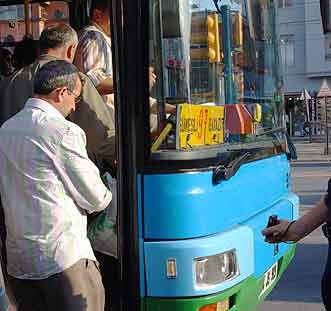
The pickpockets, of course, don’t get on the bus. Pinstripe hasn’t seen us, but another one has. He’s nice and clean-cut-looking, despite his three-day whiskers. He looks like a high-school history teacher. After blatantly photographing him, Bob approaches and offers his hand. We have no common language at all, but that doesn’t keep us from trying. We pull him aside and Bob lays some moves on him, borrowing his tool for cover. Teach breaks into a huge grin, but what does he think? That Bob is a pickpocket, or just that we caught him out, wink wink. He can’t know, and wants to get away, wants to get back to work. As if greeting a long lost confederate—or by way of desperate farewell—he kisses Bob roughly on both cheeks, then me, then Bob again, then me again. Bob is convinced it’s a sign of respect.
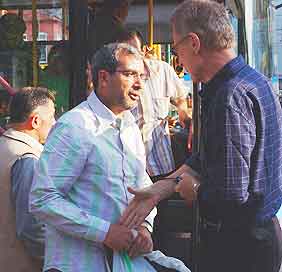
Teach takes off, but Pinstripe doggedly continues, working the boarding passengers of one bus after another. All the thieves we observe here seem to work alone, even though they may be beside a colleague. During the 90 minutes we skulked about the bus stop, we observed about 20 suspects. Were there more?
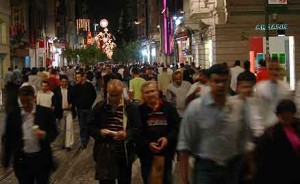
At 11 p.m. we wander up the hill to Istiklal Caddesi, the main drag in Beyoglu on the “modern side” of Istanbul. It’s still Europe, but on the other side of the Golden Horn. We talk about sitting down for a glass of wine or finding a sweet shop for some gooey Turkish desserts and tea. The street is jammed with pedestrians, and police cars are strategically parked at several intersections. I spot a suspicious character loitering around the atm, but Bob pooh-poohs my inkling. He pops into a deafening music shop to buy some new age Turkish funk while I, repelled by the volume, wait in the street and watch the people-parade.
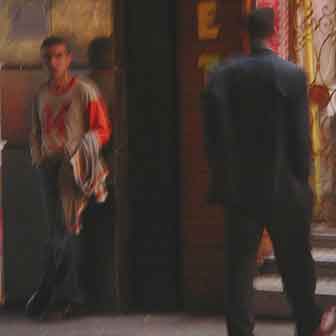
By now it’s past midnight but despite being in r&r mode, my thiefometer kicks in. I can’t help staking out the lowlife who leans against the wall, clearly lurking, holding a sweater (tool) over his arm like half the other people on the street, but in that way.
Finally he lurches into the crowd and I see that (a), he’s got a limp, and (b), he’s onto a woman with a low purse. No surprise. I follow him until he gives up on the purse and leans against another wall. I dash into the cd store and pull Bob out. We easily locate the limper again, but soon lose him in the swirl of people. His shirt front identifies him as “34.” From the back he’s all gray, but his orange sleeve beckons like a beacon, and so does his bobbing head. Mostly though, this guy just leans and lies low. We watch him make a few more half-hearted attempts just to prove to ourselves that he is what we know he is, then Bob decides to enlist a translator.
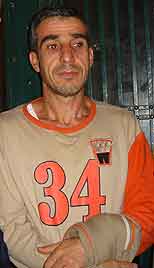
He returns dragging a plainclothes security guard from the music shop.
Surprisingly, the limping pickpocket didn’t put up any resistance or hesitate to answer our questions. And although our translator required serious cajoling to enlist, he gets into the moment. “34” is a Kurd, not married, and has been picking pockets for 20 years. He claims to be the best operator on this street, and says it is his main territory. His leg was injured when he was a child. Bob notices how delicate his fingers are, how clean, how perfectly manicured the nails.
To demonstrate a move, Bob wants to borrow 34’s sweater to use as a cover. Like most criminal thieves, Bob simply can’t steal barehanded. At first, 34 was reluctant to release his sweater. But when Bob got into position behind the translator, 34 swiftly arranged himself in front of the translator and fell slightly back into him. Bob slipped out the translator’s wallet as if he and 34 had been partners for decades.
We ask how many others work this street, and 34 says there is a woman, and some children. This street is easy, he says. How often do you succeed in getting money, Bob asks. Every time, he lies. He repeatedly presses his hands to his nose, which is red and swollen. His cheeks are scraped and he might have the beginning of a black eye. Bob asks how he hurt his face. Three hours ago, he claims, he tried to break up a fight between some friends of his.
Yeah, right. We can think of a more likely scenario.
*Turkish ice cream is thick and chewy, totally different from “our” ice cream, but delicious. It’s thickened with salep, the dried powder of a wild orchid now endangered.
![]()



